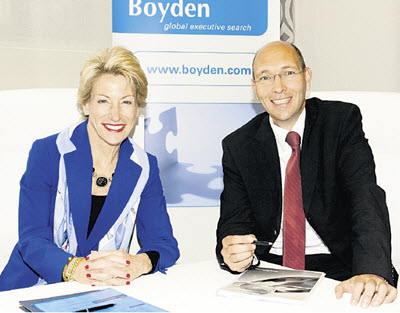Boyden President and CEO Trina Gordon discusses the importance of listening, and what it takes to be an effective global talent consultant.

Trina Gordon and Andreas Landgrebe
This article originally appeared in derStandard.
Vienna – She frequently appears in conference photos with Fortune 500 companies. Yet Trina Gordon can also be spotted on her Harley, and goes running daily. One can see it in her demeanour and her energy. In conversation, she practically creates a hermetically sealed space with her rapt attention. It comes as no surprise to find that in the evolution of the Boyden network, with 76 offices in 43 different countries, her primary issue was how well Boyden listens to its clients. In the past four years the organization has created hubs of sectoral and functional expertise, so clients have no questions about consistent global quality.
Who likes hearing that they’re doing good work, but have to improve constantly? In an age when companies do their own recruiting and put structures in place to procure talent resources, it is no longer enough to be a good consultant and also play a good game of golf, she replied with a short laugh.
By all appearances the first woman at the top of one of the five largest global executive consultancies (numbers are undisclosed as the firm is privately held), founded 70 years ago, has the reins firmly in hand. Enormous self-discipline is vital. She has been President and CEO of Boyden since 2011, adding up to 25 years of executive search experience.
Getting back to quality, to the equal footing a recruiter needs in order to execute assignments from more than just a subservient position: This is where Boyden University comes into play, where Consultants and Partners aim for the sincerity and honesty as well as the courage to initiate a genuine dialog with top executives around the globe. This is how she answers questions about responsibility.
As confidence in leadership is shattered, what is wrong with the top executives? Gordon mentions quarter-driven actions first, followed by short-sightedness. Especially supervisory boards have a crucial part to play in the realignment to broader objectives and creating more sustainability. The fact that it can work with diversity and inclusion can be observed by some examples – Gordon mentioned Xerox.
Regarding the new US President, Donald Trump, Trina Gordon did not mince words: Yes, she is concerned. No, she still does not see clearly, but the obvious overvaluation of the US stock exchanges with a considerable degree of uncertainty have given her a headache, of course.
Why should youthful, highly educated women participate in the struggle for power found in corner offices instead of founding their own social enterprise? Who aims for a career in mathematics, science or in a technical area, has remarkably high chances to become effective – including social impact.
From here on Andreas Landgrebe, Head of Austria and the CEE Region, takes over. The question is how we can justify and maintain our standard of living. This raises the subject of competition from emerging markets with their well-educated and ambitious youth – competitiveness regarding “the Chinese opponent” is a good question to raise, not only in terms of location but also on an individual level of standard of living and personal career. Only with an idealistic vision it cannot be answered.

